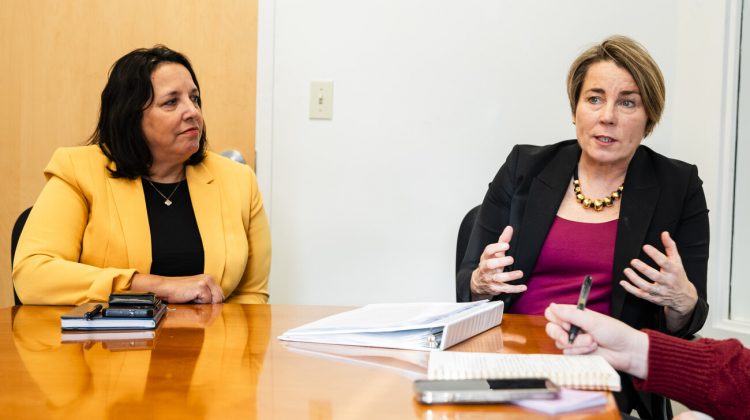LYNN — In the 10 months since they took office in January, Gov. Maura Healey and Lt. Gov. Kim Driscoll have prioritized tax cuts, MBTA improvements, and expanded benefits for veterans while navigating a migrant crisis.
The pair reflected on their administration’s recent legislation and staffing changes in a sit-down interview with The Item Monday.
Tax Cuts
Last month, the administration signed into law the Commonwealth’s first tax cuts in more than 20 years. The $1 billion package includes increases to the Rental Deduction and Housing Development Incentive Program and a reduction in the short-term capital gains tax rate.
The pair outlined how the cuts will specifically benefit seniors looking to retire in Massachusetts. These include doubling the Senior Circuit Breaker tax credit, increasing the maximum that municipalities may allow seniors to reduce their property tax, and increasing the maximum tax exemption when a property is inherited after the owner’s death.
Family members who care for seniors will also benefit from the package’s expansion of the Child and Family tax credit, which eliminates the two-dependent cap and increases the credit from $180 to $440, starting in 2024. An estimated 565,000 families will benefit.
“It’s about making life more affordable for people,” Healey said. “Many of these tax cuts are aimed at people we know who really need the help. It’s about putting real money back in the pockets of families.”
MBTA Improvements
After a summer of Sumner Tunnel closures, slow zones, and replacement shuttle buses, Healey and Driscoll seemed optimistic about the improvements coming to the region’s transportation system.
Healey admitted the MBTA has suffered from mismanagement and underinvestment over the years. She said that’s why she felt it was important to hire a new general manager for the system, Phillip Eng, and 1,000 workers. On Monday, she also announced Monica Tibbits-Nutt as Massachusetts’ secretary of transportation.
Eng, along with the administration, is credited with launching the ferry between Lynn and Boston, and expediting the reopening of the city’s Commuter Rail station. Healey also announced Monday that the long-awaited temporary platform at Lynn’s Commuter Rail station will open Dec. 18.
Healey believes public transit is a public good and that it is essential to build a safe and reliable transportation system.
“Our economic livelihood and well-being and the health and opportunity of our residents and our businesses depend on it,” Healey said. “It’s like anything else. If you don’t take care of your house, you’re going to end up with bigger problems that are much more costly to fix that create more disruption down the line. That’s the situation that I think we inherited. Now, we’ve made significant changes.”
Veteran Benefits
Over Veterans Day weekend, the pair filed the Act Honoring, Empowering and Recognizing Our Servicemembers and Veterans, or the HERO Act. The act will increase veteran annuity, the vet-hire tax cut, and local flexibility for veteran property tax exemptions. It also expands the definition of “veteran” to align with that of the United States Disabled American Veterans organization and of “veteran dependent” to align with that of the Family Court.
The package codifies dental and medical assistance benefits. It also expands the scope of the Veterans Equality Review Board and establishes a working group to study the potential benefits of alternate therapies for veterans.
Healey and Driscoll both shared their support for their appointee, Dr. Jon Santiago, who now serves as Massachusetts’ first-ever secretary of the Executive Office of Veterans’ Services.
“Jon is doing such a great job,” Driscoll said. “He also brings his medical hat, so the ability to look at if there are more innovative ways of treatment. I think he felt that we can be better. We have these amazing health professionals here, whether it’s behavioral health or treatments, and I think this bill reflects a lot of that.”
Migrant Crisis
This week, Healey and Driscoll responded to news that Massachusetts has officially reached its capacity of 7,500 families in emergency shelters.
As an influx of migrants continues arriving in Massachusetts, the number of people needing to stay in motels is growing due to a lack of shelter space. Waitlisted families can apply to the Department of Transitional Assistance for necessities such as diapers, hygiene products, and formula.
This week, Healey and Driscoll are collaborating with the U.S. Department of Homeland Security to host a work authorization clinic for migrants in the region. State buses will transport migrants from shelters to the clinic, which will be held in Middlesex County.
They also discussed the state’s partnership with the Commonwealth Corporation Foundation, which aims to provide on-the-job training to those who have yet to gain work authorization and are living in a shelter. The program is beginning as a pilot in Salem, but businesses interested in participating should contact [email protected].
“We are vigorously advocating — I am with other governors — on immigration reform and getting Congress to act, not just with respect to the migrant situation but the whole picture. The fact of the matter is every state in this country needs workers and we’ve got declining birth rates. We need to continue to support immigration,” Healey said. “We’re managing the migrant situation right now as best we can and we’re going to continue to push the Biden administration for funding.”

